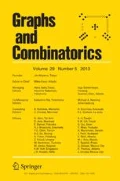Abstract
In this paper, we introduce the weighted poset game, which is defined as an extension of the poset (partially ordered set) game by adding a weight on every element of the poset. Each player has their own non-negative number of lives, and loses as many lives as the sum of the element weights they took. The player whose lives become negative first is the loser. We consider winning ways of this problem. First, for the problem with {0, 1}-weights, we find that (1) if the number of lives are different, then the player who has the large number of lives is the winner, (2) if the number of lives are the same and all maximal elements have positive weights, then the second player is a winner, and (3) otherwise, the game is reduced to an (unweighted) poset game. Next, for general weights, we consider the case where the partial order is a total order, and derive a polynomial-time algorithm for calculating who is the winner and the winning way for the winner.
Similar content being viewed by others
References
Berlekamp, E.R., Conway, J.H., Guy, R.K.: Winning Ways for Your Mathematical Plays. Academic Press, NewYork (1982)
Bouton, C., Nim, A.: Game with a Complete Mathematical Theory. Ann. Math. 3, 35–39 (1902)
Brouwer, A.E.: Chomp. Online document, http://www.win.tue.nl/~aeb/games/chomp. html (2003)
Byrnes, S.: Poset game periodicity. Integers: Electron. J. Comb. Number Theory 3, G3 (2003)
Conway, J.H., Sloane, N.J.A.: Lexicographic codes: error correcting codes from game theory. IEEE Trans. Inf. Theory IT-32, 337–348 (1986)
Deuber, W., Thomasse, S.: Grundy sets of partial orders. Diskrete Strukturen Math. 96, 123 (1996)
Huddleston, S., Shurman, J.: Transfinite chomp. In: Nowakowski, R.J. (ed.) More Games of No Chance pp. 183–212. Cambridge University Press, London (2002)
Muller, M., Gasser, R.: Experiments in computer go endgames. In: Nowakowski, R.J. (ed.) Games of No Chance, p. 273. Cambridge University Press, London (1996)
Sun, X.: The Sprague–Grundy function for Chomp. Online document, http://www.math. tamu.edu/~xsun/chomp/chomp.htm (2003)
Sun, X.: Improvements on Chomp. INTEGERS: Electron. J. Comb. Number Theory 2, G1 (2002)
Ulehla, J.: A complete analysis of Von Neumann’s Hackendot. Internat. J. Game Theory 9, 107–113 (1980)
Zeilberger, D.: Chomp, Recurrences, and Chaos(?). J. Differ. Equ. Appl. 10(13–15), 1281–1293 (2004)
Zeilberger, D.: Three-Rowed CHOMP. Adv. Appl. Math. 26(2), 168–179 (2001)
Author information
Authors and Affiliations
Corresponding author
Rights and permissions
About this article
Cite this article
Ito, H., Nakamura, G. & Takata, S. Winning Ways of Weighted Poset Games. Graphs and Combinatorics 23 (Suppl 1), 291–306 (2007). https://doi.org/10.1007/s00373-007-0710-7
Received:
Accepted:
Issue Date:
DOI: https://doi.org/10.1007/s00373-007-0710-7



